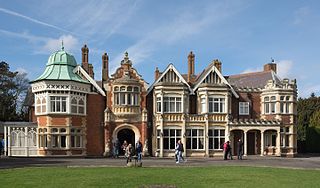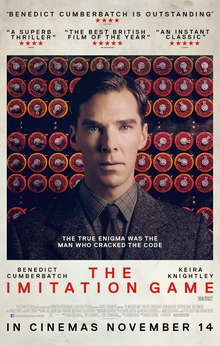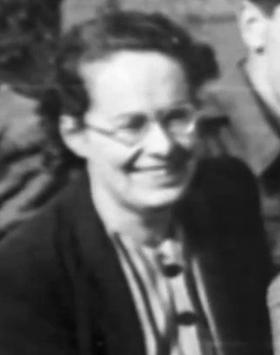
(publ. 1981 by Jonathan Cape)
The Imitation Game is a television play written by Ian McEwan and directed by Richard Eyre, a BBC Play for Today , first broadcast on 26 April 1980.

The Imitation Game is a television play written by Ian McEwan and directed by Richard Eyre, a BBC Play for Today , first broadcast on 26 April 1980.
It is 1940 in Frinton and 19-year-old Cathy Raine turns down a job at the local munitions factory and, much to the consternation of her parents and boyfriend Tony, joins the ATS. She is assigned to a wireless listening station, transcribing Enigma coded Morse transmissions from Nazi Germany and makes friends with Mary. After an altercation in a pub she is moved to Bletchley Park, the centre of the code-breaking operation, only to find herself cleaning and making tea. She overhears the male staff discussing the eponymous imitation game (as devised by Bletchley Park's Alan Turing). Cathy is befriended by Cambridge mathematics don Turner (based loosely on Turing) and they end up in bed together but for Turner it is a failure and he accuses her of planning it all to humiliate him. Later Cathy is caught in Turner's room reading documents relating to the Ultra programme, and she is incarcerated in military prison for the remainder of the war. [1]
Writing in 1980, Ian McEwan stated: "Initially I wanted to write a play about Alan Turing, one of the founding fathers of modern computers', but his researches provided very little material, 'by this time other facts about Bletchley Park interested me more. By the end of the war ten thousand people were working in and around Bletchley. The great majority of them were women doing vital but repetitive jobs...The ‘need to know’ rule meant that the women knew as much as was necessary to do their jobs, which was very little. As far as I could discover, there were virtually no women in at the centre of the Ultra secret. There was a widely held view at the beginning of the war that women could not keep secrets. I had come to think of Ultra as a microcosm, not only of the war but of a whole society...By having a woman at the centre of the film (I no longer thought of it as a play), I could disguise my own ignorance about Ultra as hers. The idea was to have her move from the outermost ring to the very centre, where she would be destroyed." [2]

Alan Mathison Turing was an English mathematician, computer scientist, logician, cryptanalyst, philosopher and theoretical biologist. Turing was highly influential in the development of theoretical computer science, providing a formalisation of the concepts of algorithm and computation with the Turing machine, which can be considered a model of a general-purpose computer. He is widely considered to be the father of theoretical computer science and artificial intelligence.

Bletchley Park is an English country house and estate in Bletchley, Milton Keynes (Buckinghamshire) that became the principal centre of Allied code-breaking during the Second World War. The mansion was constructed during the years following 1883 for the financier and politician Herbert Leon in the Victorian Gothic, Tudor and Dutch Baroque styles, on the site of older buildings of the same name.

Colossus was a set of computers developed by British codebreakers in the years 1943–1945 to help in the cryptanalysis of the Lorenz cipher. Colossus used thermionic valves to perform Boolean and counting operations. Colossus is thus regarded as the world's first programmable, electronic, digital computer, although it was programmed by switches and plugs and not by a stored program.

Ultra was the designation adopted by British military intelligence in June 1941 for wartime signals intelligence obtained by breaking high-level encrypted enemy radio and teleprinter communications at the Government Code and Cypher School (GC&CS) at Bletchley Park. Ultra eventually became the standard designation among the western Allies for all such intelligence. The name arose because the intelligence obtained was considered more important than that designated by the highest British security classification then used and so was regarded as being Ultra Secret. Several other cryptonyms had been used for such intelligence.
The Loebner Prize was an annual competition in artificial intelligence that awarded prizes to the computer programs considered by the judges to be the most human-like. The format of the competition was that of a standard Turing test. In each round, a human judge simultaneously held textual conversations with a computer program and a human being via computer. Based upon the responses, the judge would attempt to determine which was which.
Cryptography was used extensively during World War II because of the importance of radio communication and the ease of radio interception. The nations involved fielded a plethora of code and cipher systems, many of the latter using rotor machines. As a result, the theoretical and practical aspects of cryptanalysis, or codebreaking, were much advanced.

Enigma is a 2001 espionage thriller film directed by Michael Apted from a screenplay by Tom Stoppard. The script was adapted from the 1995 novel Enigma by Robert Harris, about the Enigma codebreakers of Bletchley Park in the Second World War.
Commander Alexander "Alastair" Guthrie Denniston was a Scottish codebreaker in Room 40, deputy head of the Government Code and Cypher School (GC&CS) and hockey player. Denniston was appointed operational head of GC&CS in 1919 and remained so until February 1942.

The United States Naval Computing Machine Laboratory (NCML) was a highly secret design and manufacturing site for code-breaking machinery located in Building 26 of the National Cash Register (NCR) company in Dayton, Ohio and operated by the United States Navy during World War II. It is now on the List of IEEE Milestones, and one of its machines is on display at the National Cryptologic Museum.
The Alan Turing Year, 2012, marked the celebration of the life and scientific influence of Alan Turing during the centenary of his birth on 23 June 1912. Turing had an important influence on computing, computer science, artificial intelligence, developmental biology, and the mathematical theory of computability and made important contributions to code-breaking during the Second World War. The Alan Turing Centenary Advisory committee (TCAC) was originally set up by Professor Barry Cooper

Jean Millar Valentine, laterJean Millar Rooke was an operator of the bombe decryption device in Hut 11 at Bletchley Park in England, designed by Alan Turing and others during World War II. She was a member of the "Wrens".

The Imitation Game is a 2014 period biographical thriller film directed by Morten Tyldum and written by Graham Moore, based on the 1983 biography Alan Turing: The Enigma by Andrew Hodges.

Joan Elisabeth Lowther Murray, MBE was an English cryptanalyst and numismatist who worked as a code-breaker at Bletchley Park during the Second World War. Although she did not personally seek the spotlight, her role in the Enigma project that decrypted the German secret communications earned her awards and citations, such as appointment as a Member of the Order of the British Empire (MBE), in 1946.
Mair Russell-Jones, born Mair Eluned Thomas, was a graduate in Music and German from Cardiff University who during the Second World War worked as a civilian codebreaker for the Government Code and Cypher School at Bletchley Park. She worked in Hut 6, decrypting messages in Enigma machine cipher.
"Jack Flea's Birthday Celebration" is the fourth episode of the sixth series of the BBC television series Second City Firsts written by Ian McEwan and directed by Mike Newell. The episode was recorded by the BBC at Pebble Mill and broadcast on 10 April 1976. McEwan wrote the play in 1974, just after completing his first book, First Love, Last Rites, a collection of short stories and he regards it as belonging to that collection.

About 7,500 women worked in Bletchley Park, the central site for British cryptanalysts during World War II. Women constituted roughly 75% of the workforce there. While women were overwhelmingly under-represented in high-level work such as cryptanalysis, they were employed in large numbers in other important areas, including as operators of cryptographic and communications machinery, translators of Axis documents, traffic analysts, clerical workers, and more. Women made up the majority of Bletchley Park’s workforce, most enlisted in the Women’s Royal Naval Service, WRNS, nicknamed the Wrens.
Ruth June Bourne was one of the Women of Bletchley Park who was recruited to help win World War II against the Axis Powers from 1939–1945. The Women of Bletchley Park were a secret team put together by the British government who were made to sign a Secrets Act confirming that they would not tell anyone about their work there. During her time at Bletchley, Ruth Bourne's job was not only to work on decrypting the German code system, but also to be a bombe operator. She was one of the Women's Royal Naval Service (WRENs) responsible for dismantling the bombes wire by wire after the war ended in 1945.

Alan Turing was an English mathematician, computer scientist, logician, cryptanalyst, philosopher, and theoretical biologist. He left an extensive legacy in mathematics, science, society and popular culture.
Maria Djurkovic is a British production designer for film and television.